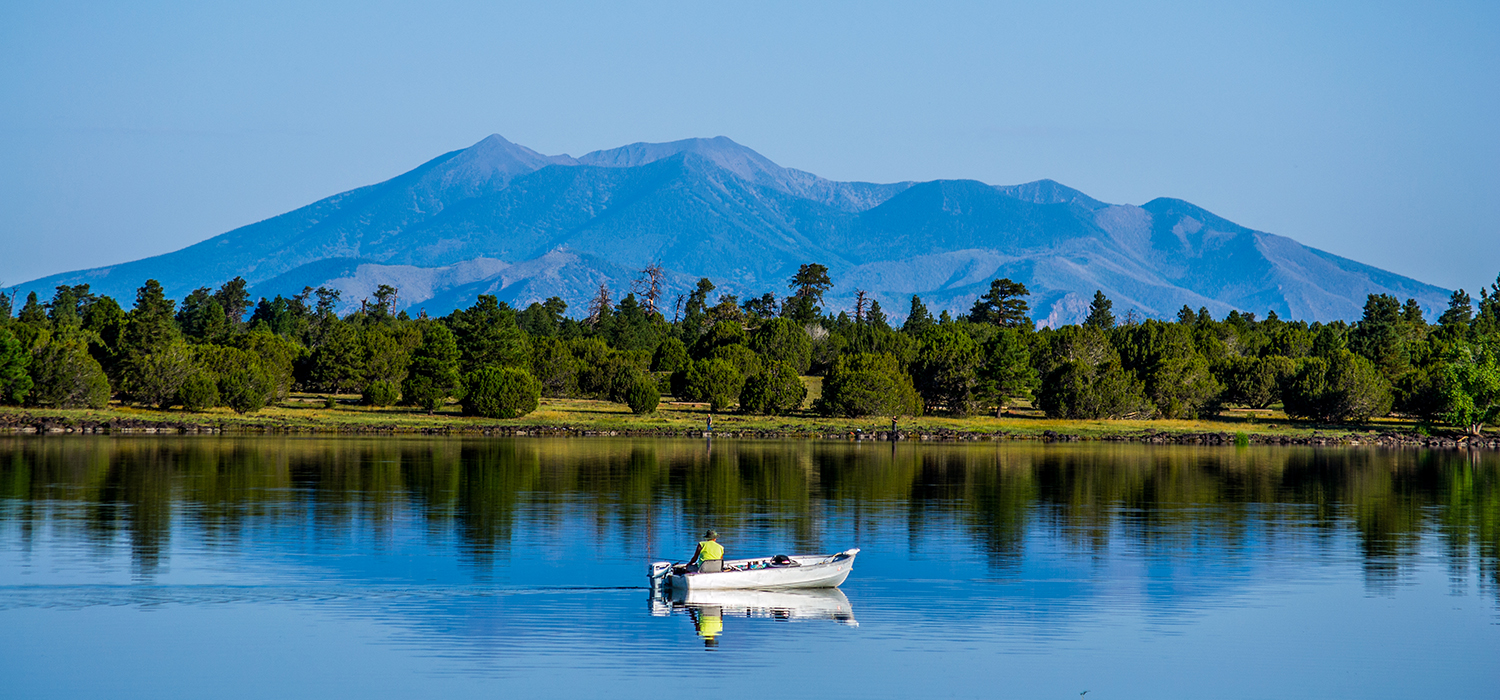
Protecting the Grand Canyon matters to northern Arizona business owners. We caught up with Steve Finch, president and CEO of the Flagstaff Lodging, Restaurant & Tourism Association, to find out why.
 Steve Finch in downtown Flagstaff. BLAKE MCCORD.
Steve Finch in downtown Flagstaff. BLAKE MCCORD.
Steve: Flagstaff is a city whose economy depends on tourism. Look at our restaurant ratio to the population. And the same thing with hotels. We’re sitting at over 5,000 rooms in the city right now.
Steve: We just recently added “tourism” into our title so that people would understand that we’re not just restaurants, we’re not just lodging, we’re laser tag, coffee shops, golf courses. We have a membership, but there’s nobody in the business community that’s not impacted by what we do. If you’re working in a factory, or in retail, or the service industry, saying “tourism doesn’t impact me,” well absolutely it does because the tourists come here and leave their dollars behind, and that allows our cost of living to be less because they pay taxes, and therefore our property taxes don’t have to be as high.
Steve: It’s about $180 to $185 per day, per person left in Flagstaff for people who spend a night. If they don’t spend a night, it’s about $85 to $90. The more people that stay here, the better the city becomes, because there are more tax dollars. We have sales tax, and then the BBB tax on top of that. The fact is, if you’ve got one person who spends $100, or four people who spend $400, which does the city get more from? And businesses have the $400 in their till. If tourism was to go away, a lot of businesses wouldn’t be able to afford to keep their doors open.
 Downtown Flagstaff. BLAKE MCCORD.
Downtown Flagstaff. BLAKE MCCORD.
Steve: Without the Grand Canyon, our tourism would probably be a third to 20 percent of what it is right now. The Grand Canyon is one of the Seven Natural Wonders of the World. And we have to protect that. We want to make sure that the park stays protected not for our generation, but for our kids’ generation, and our future kids’ generations.
The hotels and restaurants, even the retail shops here in town, they’re all linked. How many souvenir shops do you have downtown? How many fudge shops? They’re all in it together. Even though people may not work directly in the park, or in a restaurant or a lodge, they’re still benefiting because tourism comes into northern Arizona. You’d be hard-pressed to tell me a business here in town that isn’t benefiting in some way from tourism.
Steve: People today are much more health conscious. They understand more about uranium, and the uranium dust and tailings left behind. Native Americans have been raising these issues all along, and they’re finally being heard. That information is rippling out. And if tourists look it up, they can find out just how dangerous that material is. It’s bad enough that we’re fighting to get the existing tailings removed, but then they want to turn around and create new mines. Representatives of the uranium industry have said, “It’s going to be sealed, it’s safe.” But what about the what-ifs? What if it spills and goes into a riverbed? “Oh, it’ll be polluted for a while, and everything downstream of it will be polluted for a while.” How long is that while? That’s what we’re really worried about. And that’s why we’re really against new mines. The land is not that rich with uranium. The mining isn’t a long-term operation, yet it still produces all these contaminated tailings. My concern is that it’s going to scare away people, if it hasn’t already.
Steve: I’d love to say the Grand Canyon was first and foremost on their radar, and truthfully I bet they wish it was too. Just the cost of having a business here in town, that’s their top concern. They’re trying to make enough money in the summer to make it through the winter. It’s very difficult. I’ve got people who’ve owned restaurants for several years and they actually have a second job themselves, they worry about paying their staff first, their suppliers next, and then, guess what, there isn’t anything left. They want their businesses to thrive; they want to pass them on to their kids.
But that is not to say that the Grand Canyon isn’t there. It is. They’re 100 percent on board. I’ll say the blessing is having the Grand Canyon Trust as the point on this. I’m really proud to be associated with the Trust in supporting this effort to protect our Grand Canyon.
You know, if that was the only ground in all the U.S. that had uranium and it was extremely rich and profitable, I would probably be a little hard-pressed to say that. But there are other sites that have much better uranium sources and they’re less expensive to pull out of the ground. So if I can go to a place that’s easier access, less cost, and I can get it to market and my profit is more, why worry about going into a national park? You’ve got a two-lane road going in and coming out of that place. The last thing we want are uranium trucks going through; the road’s already busy enough. Our members understand that the Grand Canyon Trust is working to keep the Grand Canyon grand, and they’re 100 percent in sync with it, which is really cool.
EDITOR'S NOTE: The views expressed by Advocate contributors are solely their own and do not necessarily represent the views of the Grand Canyon Trust.

Also in this issue:
Hunters and anglers are big on conservation in the Grand Canyon region. Read more ›